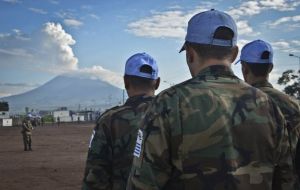MercoPress. South Atlantic News Agency
With no budget by Thursday, UN peacekeeping missions to be frozen
 Uruguayan blue helmets have been stationed in Cambodia, Haiti and currently are in Goma, one of the most dangerous zones in Zaire
Uruguayan blue helmets have been stationed in Cambodia, Haiti and currently are in Goma, one of the most dangerous zones in Zaire United Nations has instructed peacekeeping missions “to make contingency plans” to leave since no agreement has been reached for the financial year beginning July first, and which could lead to a freeze of activities, diplomats revealed. The roadblock allegedly stems from China and African countries making multiple last-minute requests.
The budget for the UN's global peacekeeping operations - about 20 missions worldwide, with nearly 100,000 Blue Helmets mobilized (including some 2,000 from Uruguay) - amounts to about US$6.5 billion and covers a 12-month period starting each year on Jul 1, which is Thursday.
The UN under secretary-general for peacekeeping operations, Jean-Pierre Lacroix, told a video press conference that already last year, budget negotiations among the member states were complicated. But those talks ended with a deal on Jun 23, 2020 - a week ahead of the deadline.
This year, “the risk is that for a while until a decision on budgets is reached by the General Assembly, our missions will find themselves under strict constraints, to only spend on measures to protect our personnel,” Lacroix said.
“This is a worrying possibility, especially in an environment in which most of our missions are operating in very difficult, problematic and dangerous circumstances,” he added.
UN spokesperson Stephane Dujarric said peacekeeping missions had been advised of the situation, and were asked to make contingency plans should the missions have to be interrupted.
“We await the decision by the member states and hope that they will come to a decision promptly,” he said, highlighting that without an agreement, missions would no longer be able to incur any expenditures starting Thursday.
“In the absence of a decision by the General Assembly, the secretary-general can only enter into financial commitments to provide for the safety and security of staff and peacekeeping personnel,” and to safeguard UN assets, Dujarric explained.
The United States is largest assessed contributor to the peacekeeping budget, responsible for about 28%, followed by China with 15.2% and Japan with 8.5%.




Top Comments
Disclaimer & comment rulesCommenting for this story is now closed.
If you have a Facebook account, become a fan and comment on our Facebook Page!